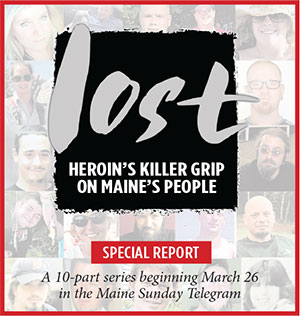Addiction recovery advocates praised the state’s decision to adopt an emergency rule change Tuesday that will allocate nearly $5 million toward treatment of MaineCare recipients and uninsured individuals who are struggling with opioid dependency.
The state’s Opioid Health Home model is a team-based model of care that focuses on treating the whole person through substance abuse counseling, care coordination, medication-assisted treatment, peer support and medical consultation.
Steve Cotreau, program manager for the Portland Recovery Community Center, said the Opioid Health Home model could potentially provide some funding for a “recovery residence” for women that is under development in Greater Portland.
That residence and three additional homes being planned by a group called the Greater Portland Addiction Collaborative have the potential to treat up to 48 men and women, according to Cotreau.
“It’s a very good thing,” he said. “It’s a huge step, a very positive step forward by the state.”
Maine Health and Human Services Commissioner Mary Mayhew announced that she launched the Opioid Health Home model by signing an emergency rule Tuesday earmarking $4.8 million for comprehensive, medication-assisted outpatient heroin and opioid treatment.
State officials say the combination of state and federal funds will provide treatment for more than 400 patients on MaineCare, the state’s version of Medicaid, as well as those who are uninsured.
Cotreau said the state model holds promise because it offers people who are addicted home treatment options and not only outpatient care. He pointed out that those in the throes of addiction are in a “rapid state of decline,” losing jobs and housing very quickly.
“Because the decline is so steep, the counteraction has to be just as intense,” he said.
Melissa Skahan, a vice president at Mercy Hospital in Portland and a member of the Greater Portland Addiction Collaborative, commended Mayhew and the state for supporting the Opioid Health Home treatment model.
“The model is a very powerful, evidence-based approach to addiction,” Skahan said. “It could be something that helps move the dial in a positive direction. It is a great turn of events.”
Skahan said the collaborative’s first recovery residence will serve only women, but additional homes will serve men and women.
She predicts the homes will become a valuable component of the addiction recovery network, offering those in need a stable environment in which to recover.
The Department of Health and Human Services “continues to make it a priority to invest in integrated treatment approaches that will produce the best outcomes for individuals facing substance abuse disorder,” Mayhew said in a statement. “The Opioid Health Home model provides integrated and coordinated treatment for opioid addiction that is focused on medication-assisted treatment and counseling to support improved access to primary care-based treatment services, improved retention in treatment, and improved outcomes for recovery.”
The home model will focus on expanding primary care access by integrating primary care and addiction treatment services. The model will also encourage prescribers of buprenorphine – also known as Suboxone – to increase their prescribing capacity, Mayhew said.
“Under this model, the individual and their provider will be able to create a treatment plan that best suits their need; this includes the level and frequency of office visits and dosing,” Mayhew said. “By linking primary care with the provision of medication-assisted treatment, we will be able to reach more individuals and deepen our state’s ability to provide treatment to those who need and are actively seeking access to treatment.”
Dennis Hoey can be contacted at 791-6365 or at:
dhoey@pressherald.com
CORRECTION: This story was updated at 10:55 a.m. on April 12, 2017 to correct the spelling of Melissa Skahan’s name.
Send questions/comments to the editors.




Success. Please wait for the page to reload. If the page does not reload within 5 seconds, please refresh the page.
Enter your email and password to access comments.
Hi, to comment on stories you must . This profile is in addition to your subscription and website login.
Already have a commenting profile? .
Invalid username/password.
Please check your email to confirm and complete your registration.
Only subscribers are eligible to post comments. Please subscribe or login first for digital access. Here’s why.
Use the form below to reset your password. When you've submitted your account email, we will send an email with a reset code.